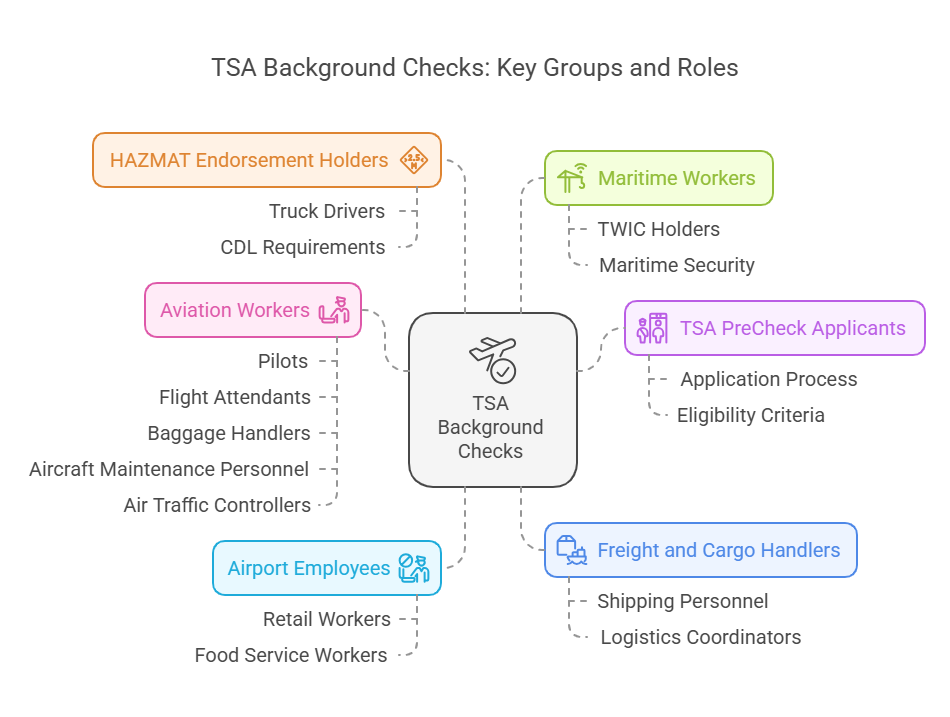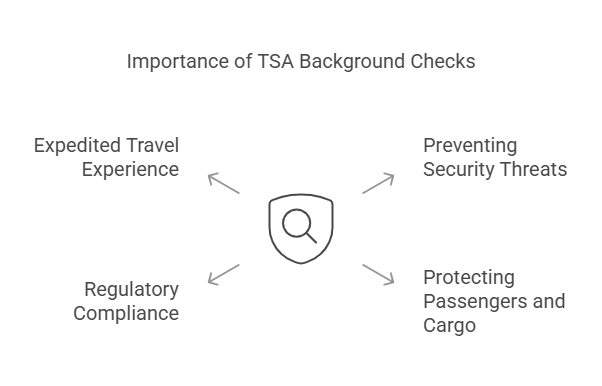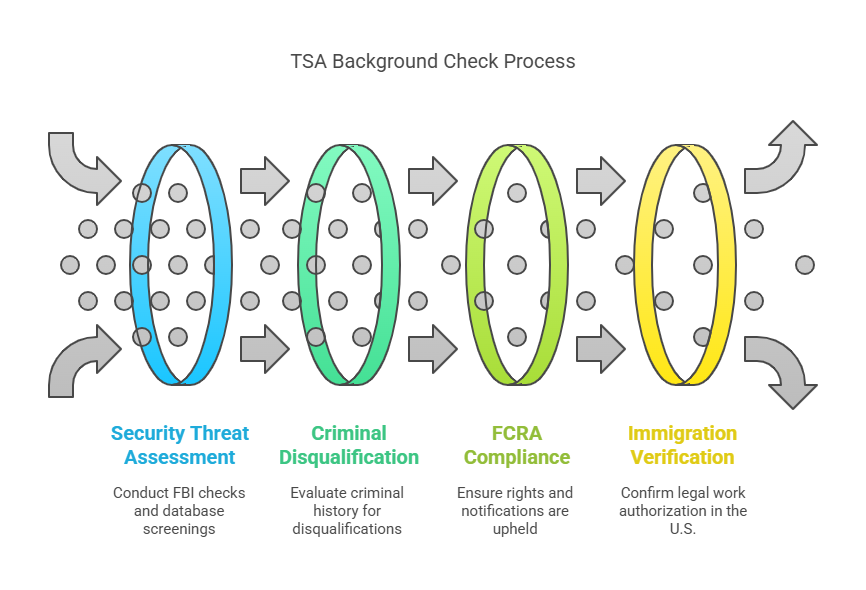Tips for a Smooth TSA Background Check Experience

Overview and Importance of TSA Background Checks
A TSA background check is a thorough screening process conducted by the Transportation Security Administration (TSA) to ensure individuals working in or accessing secure areas of airports and other transportation hubs meet federal security standards. The primary purpose of this background check is to prevent security threats and ensure the safety of travelers and airport personnel.
TSA background checks involve an extensive review of an individual’s criminal history, immigration status, employment history, and potential ties to terrorism. The depth of the investigation depends on the level of clearance required for a particular role.
Who Needs a TSA Background Check?

TSA background checks are essential for individuals seeking employment in security-sensitive positions within the transportation industry. The following groups typically require TSA clearance:
- Aviation Workers – Pilots, flight attendants, baggage handlers, aircraft maintenance personnel, and air traffic controllers.
- TSA PreCheck Applicants – Travelers applying for TSA PreCheck, a program that allows for expedited security screening.
- Airport Employees – Individuals who work in restricted airport areas, including retail and food service workers.
- Freight and Cargo Handlers – Workers involved in shipping and logistics who require access to restricted areas of an airport.
- Hazardous Materials (HAZMAT) Endorsement Holders – Truck drivers transporting hazardous materials must pass a TSA background check to obtain a HAZMAT endorsement on their commercial driver’s license (CDL).
- Maritime Workers (TWIC Holders) – Individuals who need a Transportation Worker Identification Credential (TWIC) for access to secure maritime facilities.
Different Levels of TSA Security Clearance
There are multiple levels of TSA background checks depending on the type of clearance required. Below are the primary security clearance levels:
- Standard TSA Background Check
- Used for general airport employees and TSA PreCheck applicants.
- Includes fingerprint-based criminal history checks and verification of identity.
- Security Threat Assessment (STA)
- Required for individuals seeking a TWIC card, HAZMAT endorsement, or SIDA badge (Secure Identification Display Area access).
- Involves more rigorous screening, including immigration status verification and checks against terrorism watchlists.
- Federal Aviation Administration (FAA) Security Clearance
- Mandatory for pilots and aviation mechanics.
- Involves a review of professional credentials, employment history, and security risk assessments.
- Customs and Border Protection (CBP) Clearance
- Needed for airport workers with access to customs-controlled areas.
- Includes interviews and additional screenings by U.S. Customs and Border Protection.
Why Are TSA Background Checks Important?

TSA background checks play a critical role in national security by preventing unauthorized individuals from gaining access to sensitive transportation areas. The key reasons why these checks are essential include:
- Preventing Security Threats – Ensures that employees in transportation hubs have no history of terrorism-related activities.
- Protecting Passengers and Cargo – Reduces risks associated with criminal activities, smuggling, and potential sabotage.
- Regulatory Compliance – Ensures that businesses operating in the transportation sector comply with federal security laws.
- Expedited Travel Experience – For TSA PreCheck applicants, passing a background check allows them to enjoy faster airport security screening.
Step-by-Step Guide to the TSA Background Check Process
The TSA background check process involves multiple steps, ensuring that only eligible and trustworthy individuals receive security clearance. Below is a step-by-step guide to what you can expect when applying for a TSA background check:
Step 1: Determine Eligibility
Before beginning the application process, you must ensure that you meet the basic eligibility criteria. While different TSA programs have varying requirements, most require applicants to:
- Be a U.S. citizen, lawful permanent resident, or hold legal work authorization.
- Have a clean criminal record with no disqualifying offenses.
- Be applying for a job or clearance that mandates a TSA security check.
Certain industries, such as aviation, freight, and maritime transportation, require employees to undergo more rigorous background checks than standard TSA PreCheck applicants.
Step 2: Submit an Online Application
Once eligibility is confirmed, applicants must complete an online application through the relevant TSA or third-party enrollment website. The application requires:
- Personal information (full name, date of birth, Social Security number, etc.).
- Employment history (for positions requiring TSA clearance).
- Legal documentation (passport, driver’s license, or other valid identification).
- Consent for a background investigation (including fingerprint-based criminal record checks).
Different TSA programs have specific application portals. For instance:
- TSA PreCheck applications are submitted via the Universal Enrollment Services website.
- TWIC and HAZMAT endorsements require applications through the Transportation Security Clearinghouse or the Department of Homeland Security (DHS).
Providing accurate and complete information reduces processing delays and minimizes the risk of rejection.
Step 3: Schedule an In-Person Appointment
After submitting an online application, applicants must schedule an in-person appointment at a TSA-approved enrollment center. These centers are available nationwide, often located in:
- Major airports
- Transportation offices
- Government service centers
During the appointment, applicants are required to:
✅ Provide biometric data, including fingerprint scans.
✅ Present original identification documents for verification.
✅ Answer security-related questions regarding their background and employment.
This step ensures that TSA verifies the applicant’s identity before conducting a thorough background investigation.
Step 4: Undergo a Comprehensive Background Check
TSA performs an in-depth Security Threat Assessment (STA) on every applicant. This assessment includes:
- Criminal history check – Using FBI databases to identify any past convictions.
- Terrorism watchlist screening – Ensuring the applicant is not a security risk.
- Immigration status verification – Checking the legal work eligibility of non-citizens.
- Employment history review – Verifying past employment records for security-sensitive roles.
The depth of screening depends on the type of security clearance requested. For example, a TWIC card applicant undergoes a more rigorous assessment than a TSA PreCheck applicant.
Step 5: Application Approval or Denial Notification
Most applicants receive their TSA background check results within 30 to 60 days. However, processing times can vary based on the complexity of the background check.
- Approved applicants receive a notification confirming their TSA clearance, TWIC card, or TSA PreCheck status.
- Denied applicants receive a formal notice with reasons for disqualification and information about the appeal process.
Applicants who receive a denial can request a redress or appeal the decision if they believe there was an error in the background check findings.
TSA Background Check Requirements
To complete a TSA background check, applicants must provide specific documents and meet program-specific eligibility criteria. Below is a summary of the key requirements:
| Requirement | Details |
|---|---|
| Valid Identification | Passport, driver’s license, or state-issued ID. |
| Proof of Citizenship or Legal Status | Birth certificate, naturalization certificate, or work authorization. |
| Employment History | A detailed record of previous employers, particularly for security-sensitive jobs. |
| Fingerprinting | Submitted during the in-person enrollment appointment. |
| Criminal Record Check | TSA reviews criminal history and may disqualify individuals with certain offenses. |
| Payment of Fees | Application fees range from $78 to $125, depending on the program. |
Ensuring that you have the correct documents before applying reduces delays and increases approval chances.
Common Reasons for TSA Background Check Denial
TSA denies applications for various reasons, many related to security threats, criminal records, or documentation issues. Below are the most common disqualifiers:
| Reason for Denial | Explanation |
|---|---|
| Serious Criminal Convictions | Felony offenses such as terrorism, murder, or drug trafficking. |
| Terrorism Watchlist Presence | If an applicant appears on federal security lists. |
| False or Fraudulent Documentation | Submitting altered or fake identification records. |
| Outstanding Arrest Warrants | Unresolved legal issues can delay or disqualify an application. |
| Immigration Violations | Individuals without legal status in the U.S. may be denied clearance. |
If denied, applicants can appeal the decision by providing supporting documents or requesting a waiver, depending on the nature of the disqualification.
How Exact Background Checks Can Assist You
At Exact Background Checks, we specialize in assisting individuals and businesses with TSA-related background screening processes. Our services help streamline applications, ensure compliance, and reduce the chances of disqualification.
✅ Pre-Screening & Eligibility Assessment – We review your background before you apply to identify potential red flags.
✅ Document Verification – We help ensure that all required identification and supporting documents are valid and correctly submitted.
✅ Criminal Record Review – If you have a criminal history, we assist in determining if it may affect your TSA approval.
✅ Application Assistance – We provide step-by-step guidance for submitting TSA applications correctly.
✅ Appeal & Redress Support – If you are denied, our team helps you file an appeal or request reconsideration.
By working with Exact Background Checks, you increase your chances of approval while ensuring your application is handled accurately and efficiently.




